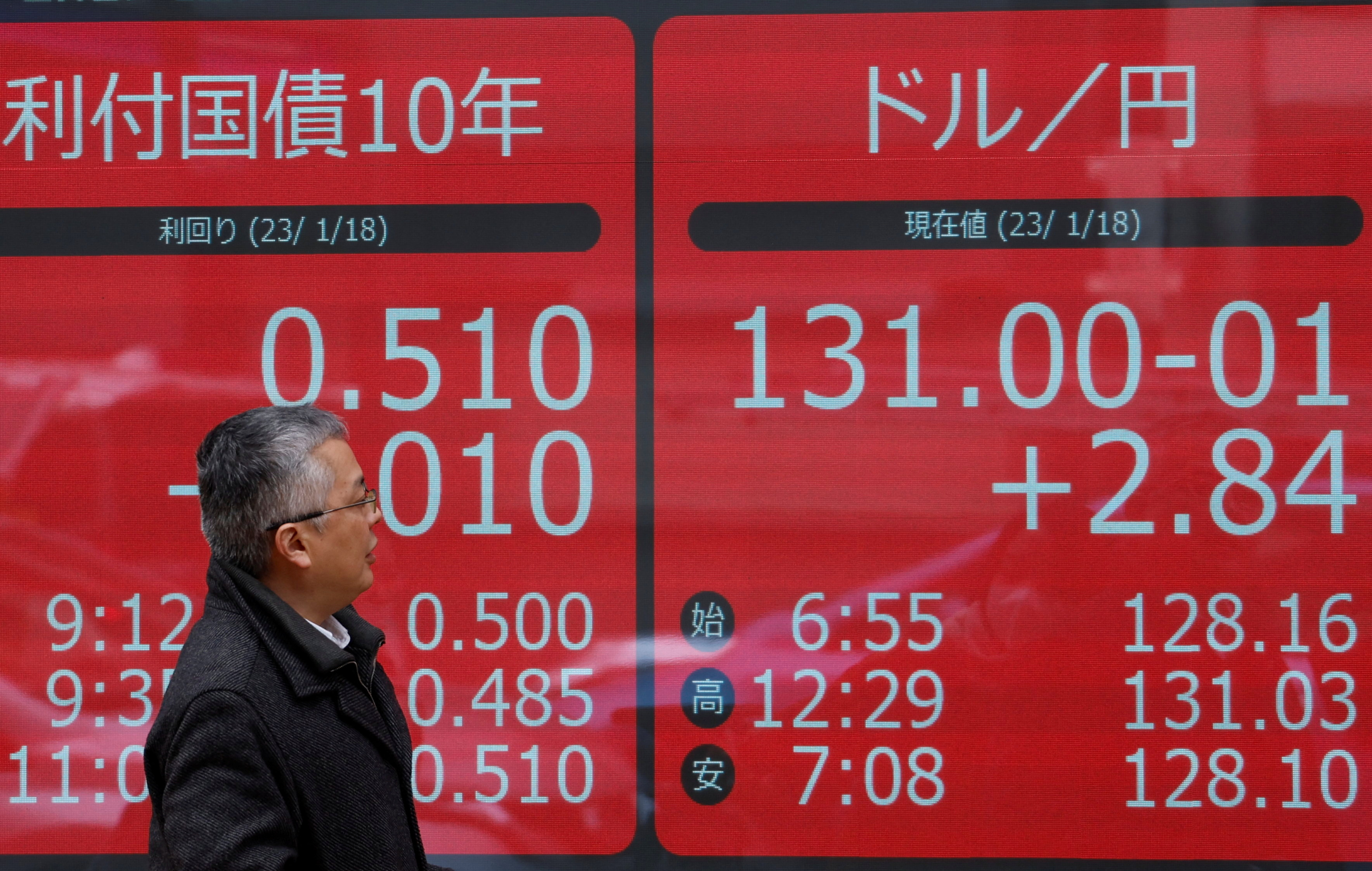
World stocks eked out a 5-1/2 month high and the dollar held close to an eight-month low on Friday, as reassuring U.S. economic and inflation data kept the bulls largely in charge ahead of next week’s slate of top central bank meetings.
Asia-Pacific shares maintained their best start to a year (.MIAPJ0000PUS) overnight with a 9-month high despite ongoing drama in India. Though Europe (.STOXX) and Wall Street futures looked down, MSCI’s all-country index (.MIWD00000PUS) was still on a 6-day winning streak, just about.
The tug-of-war over whether the good news that major economies are holding up and inflation is coming down might just encourage the Federal Reserve and co to keep hiking interest rates was playing out everywhere.
Currency traders who had pushed the dollar up after news the U.S. economy grew faster than expected at the end of last year were offloading it again, as the same time as dealers were nudging the benchmark government bond yields that reflect borrowing costs back up.
Add in a rise in oil prices but also a near 16-month low in European gas prices – and the recent huge shifts in the Japanese yen and China’s COVID restrictions – and it was a mixed picture to say the least.
“The data at the moment is kind of telling you what you thought you knew – that inflation is slowing but that the labour market remains tight,” said Societe Generale strategist Kit Juckes
“Everyone is now saying perhaps we have gone too far in January,” he added, pointing to the big dollar, yen and euro moves, “So now we are sat back on our haunches a bit trying to get positions out of our feet”.
One the most explosive stories of the week continued in India where shares of Adani Enterprises (ADEL.NS) sank another 20% as the fallout continued from a scathing report by a U.S. short seller Hindenburg Research about the firms debt levels and use of tax havens.
Seven listed companies of the Adani conglomerate – controlled by one of the world’s richest men Gautam Adani – have lost a combined $45 billion in market capitalisation since Wednesday, casting serious doubt on the company’s record $2.45 billion share sale plan.
Adani Group has dismissed the Hindenburg report as baseless.
“There were heavy positions in Adani group (shares), the way they have risen in the last couple of years,” said Neeraj Dewan, director at Quantum Securities in New Delhi.
“This is a classic case of panic selling,” he said, noting the concerns were also spreading to Indian banks with exposure to Adani Group’s debt.
More broadly though the record January rally in MSCI’s Asia-Pacific ex-Japan index continued, meaning it is now up nearly 11% this year having fallen nearly 20% in 2022. Japan’s Nikkei (.N225) is up a more modest 5% follow the surge in the yen.
Thursday U.S. data had shown consumers boosting Q4 spending on goods, but it could be the last quarter of solid GDP growth before the lagged effects of the Federal Reserve’s jumbo interest rate hikes are fully felt.
A separate report showed that labour market remains tight and could lead the Fed to keep interest rates higher for longer.
Ashwin Alankar, head of Global Asset Allocation at Janus Henderson Investors, said the headline GDP suggested robust economic activity and if a recession were to materialize it would be a shallower one.
“Overall GDP data was a ‘tale-of-two cities’ – good overall growth stemming from less-than-ideal drivers and prices mitigating but at a rate that is worrisome.”
Futures markets are now pricing in a 94.7% probability of a 25-basis-point hike next Wednesday and see the Fed’s overnight rate at 4.45% by next December, or lower than the 5.1% rate Fed officials have projected into next year.
Data on U.S. personal consumption expenditures (PCE) due at 1330 GMT will provide further clues on inflation.
“The disinflation impulse is likely to stretch further, as has been evident from CPI (Consumer Price Index) releases lately, likely continuing to build a case for a 25 basis point rate hike by the Fed next week,” Saxo strategists said.
Next week will also feature Bank of England and European Central Bank meetings both of whom are expected to keep pushing up their rates in the coming months.
Japan’s potential move away from borrowing cost suppression is also key. Data there overnight showed core consumer prices in Tokyo, a leading indicator of nationwide trends, rose 4.3% in January from a year earlier, marking the fastest annual gain in nearly 42 years.
The Japanese yen strengthened to 129.79 per dollar as the data reinforced market expectations that quickening inflation could nudge the Bank of Japan to move away from its ultra-easy policy.
“We still think the policy change is a long way off,” ING regional head of research Robert Carnell said. “The spring salary negotiations are key to watch as wage growth is a prerequisite for sustainable inflation.”
The dollar index , which measures the U.S. currency against six other peers, gave back most its overnight gains against other currencies too to sit at $1.0886 per euro and $1.23805 to the British pound.
Oil prices rose on expectations of a boost to demand from China’s reopening and after the strong U.S. data. Both Brent and U.S. West Texas Intermediate crude rose 1.3% to $88.66 and $82.03 per barrel respectively.

